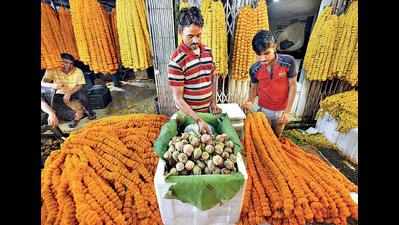- News
- City News
- delhi News
- Pandemic proves a thorn in the side of Delhi's flower sellers
Trending
This story is from October 13, 2020
Pandemic proves a thorn in the side of Delhi's flower sellers
The city’s biggest flower market at Ghazipur has wilted under the pressure of Covid-19. Having logged huge losses in the past six months due to the pandemic, traders are playing safe as the festive season approaches. But with restrictions on religious gatherings in temples or in pandals, weddings and social events, flower sellers are glumly looking at no more than 60% business this time compared with normal years.

Vendor waiting for customers at wholesale flower market (Photo- Sanjeev Rastogi)
NEW DELHI: The city’s biggest flower market at Ghazipur has wilted under the pressure of Covid-19. Having logged huge losses in the past six months due to the pandemic, traders are playing safe as the festive season approaches. But with restrictions on religious gatherings in temples or in pandals, weddings and social events, flower sellers are glumly looking at no more than 60% business this time compared with normal years.
Jaiveer Singh said that the sellers are literally praying for flower prices to pick up.“Marigold, which cost Rs 20-25 a kilo in the non-peak season till last year, is available at Rs 15 now because there are no buyers,” he said. “I don’t think its price will rise to more than Rs 50 unlike earlier when the rate shot up to Rs 100 during Navratri, Dussehra and Diwali.”
Singh said that 50 trucks, each with 15 quintals of flowers reached Delhi in the days before Navaratri every year. “This supply is almost the same this year, but the prices of different flower species are a third of the usual,” said Singh.
Traders pointed that with flower markets from across India supplying 70% of their production to Ghazipur, the demand and prices of flowers at this Delhi market defined the situation in other flower hubs too. “In the flower markets in Kota, Ratlam and Mumbai, the price of marigold has not risen beyond Rs 5 per kg,” said seller Kishan Kumar.
Vijay Sisodia, chairman of the Ghazipur flower market committee, said, “Last year, between April and August, the market did business of Rs 125 crore. This year, this came down to Rs 25 crore.” He revealed that temples like Iskcon bought only 10% of their usual demand. Sisodia mused about a revival path and higher prices soon, pointing out that lack of supply of marigold in August had taken its price to Rs 200 a kilo.
Imports have also been affected by the pandemic, so fewer cut varieties of exotic species are arriving from overseas. These constitute 30% of the flowers sold at the market and are mainly in demand for wedding decorations.
“While popular international varieties like purple orchids from Thailand and anthurium from South Africa are not available due to no-supply, we have made arrangements for other popular cut flowers,” said Sisodia. “We are bringing tulip from Kashmir, lily from Himachal Pradesh and Haryana, carnation from Uttarakhand and gerbera from Maharashtra.”
Jaiveer Singh said that the sellers are literally praying for flower prices to pick up.“Marigold, which cost Rs 20-25 a kilo in the non-peak season till last year, is available at Rs 15 now because there are no buyers,” he said. “I don’t think its price will rise to more than Rs 50 unlike earlier when the rate shot up to Rs 100 during Navratri, Dussehra and Diwali.”
Singh said that 50 trucks, each with 15 quintals of flowers reached Delhi in the days before Navaratri every year. “This supply is almost the same this year, but the prices of different flower species are a third of the usual,” said Singh.
Traders pointed that with flower markets from across India supplying 70% of their production to Ghazipur, the demand and prices of flowers at this Delhi market defined the situation in other flower hubs too. “In the flower markets in Kota, Ratlam and Mumbai, the price of marigold has not risen beyond Rs 5 per kg,” said seller Kishan Kumar.
What rankles is the uncertainty about demand. “The government is doing its best to help us, but people are apprehensive about using loose flowers in decorations,” claimed Kumar. With the closure of flower mandi for two months due to the lockdown, there was no place for flower growers to sell their products and they disposed of their last pick in April-May.”
Vijay Sisodia, chairman of the Ghazipur flower market committee, said, “Last year, between April and August, the market did business of Rs 125 crore. This year, this came down to Rs 25 crore.” He revealed that temples like Iskcon bought only 10% of their usual demand. Sisodia mused about a revival path and higher prices soon, pointing out that lack of supply of marigold in August had taken its price to Rs 200 a kilo.
Imports have also been affected by the pandemic, so fewer cut varieties of exotic species are arriving from overseas. These constitute 30% of the flowers sold at the market and are mainly in demand for wedding decorations.
“While popular international varieties like purple orchids from Thailand and anthurium from South Africa are not available due to no-supply, we have made arrangements for other popular cut flowers,” said Sisodia. “We are bringing tulip from Kashmir, lily from Himachal Pradesh and Haryana, carnation from Uttarakhand and gerbera from Maharashtra.”
End of Article
FOLLOW US ON SOCIAL MEDIA










